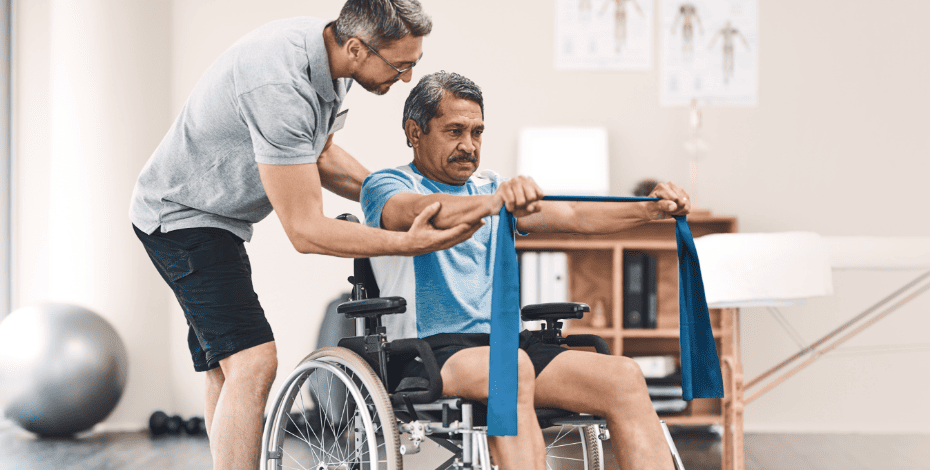
The who, how and why of a PhD

Physiotherapy is an evidence-based profession, but to have a healthy evidence base, there needs to be a robust population of researchers, from PhD students through to lead investigators on a range of research projects. A look at why physiotherapy research is a viable career pathway, who is doing physiotherapy PhDs and how they got there.
Research is the backbone of physiotherapy; clinicians rely on evidence showing which treatment approaches work.
And underpinning physiotherapy research programs across Australia—and across the world—are PhD students, the workhorses of research output.
A PhD, formally known as a Doctor of Philosophy, is the highest postgraduate academic achievement and is awarded for original research expanding the boundaries of the field under study, in the form of a thesis often comprising a group of published papers.
There’s no right way to get into research and there are many reasons for getting involved, says Professor Prue Morgan, FACP, Specialist Neurological Physiotherapist (as awarded by the Australian College of Physiotherapists in 2008), Head of Physiotherapy at Monash University and President of the Council of Physiotherapy Deans Australia and New Zealand.
She says some, often quite senior, clinicians have questions driving them into research in search of answers.
But there are also younger physiotherapists whose exposure to research during their training or as a junior clinician ignites a passion for research.
‘Most students come into a physiotherapy program wanting to be a clinician and that’s their goal—the minute they graduate they want to get out there and treat patients.
'There are a small proportion who get bitten by the research bug and want to go straight into research, but they are a minority.
'I would imagine most want to have at least a few years of clinical practice under their belt,’ Prue says.
Most commonly, physiotherapists pursue research as a way of solving a problem for a particular condition or patient population, says Edith Cowan University’s Professor Barby Singer, FACP by Original Contribution.
‘Every research student I’ve ever supervised has come with a clinical question, a burning clinical question for their practice,’ Barby says.
‘Once you scratch the surface of most clinical questions, there’s half a dozen questions underneath and suddenly the thing you thought you were going to do becomes more complicated, and somebody says to you, “This is a PhD quantity of work.
"Why are you not enrolled in a PhD?”.’
Universities rely on a steady stream of PhD students, not just because they are vital members of research teams, but because they contribute to physiotherapy training, initially as tutors and demonstrators and then as lecturers once they graduate.
Professor Arianne Verhagen, Head of Physiotherapy at the University of Technology Sydney’s Graduate School of Health, says she is seeing fewer potential PhD candidates in physiotherapy and that some colleagues at other universities are reporting the same thing.
‘I’m not sure about the Australia-wide number [of PhD students], but I do know we have been having sincere difficulties in getting PhD students.
'So have a lot of other physio departments and research groups, as far as I’m aware from chatting to a lot of friends and colleagues,’ says Arianne.
Part of the issue may be that graduating physiotherapists are keen to work with patients and don’t see research as a viable career path, she says.
It’s a view only partially shared by Prue, who notes that there is increasing awareness of the value of a PhD outside academia.
‘Ten years ago you would only ever do a PhD if you wanted to work in academia or in some sort of research institute—if you were wanting to completely walk away from clinical practice, in fact.
'Now there’s an increased understanding that actually it can really add value to your practice, allowing you to lead teams with the skills you’ve developed and to ensure you’re delivering evidence-based practice and to help to generate the evidence where it doesn’t exist,’ she says.
Career paths for a physiotherapist with a PhD
This raises the question: are there jobs out there for PhD-qualified physiotherapists to use the skills learned during their research program?
The fact is that employment opportunities for a research-focused physiotherapist in the academic sector are limited.
‘Getting jobs in academia is more and more challenging.
'There are obviously fairly tight budgets and so there may not be jobs available in academia,’ says Prue.
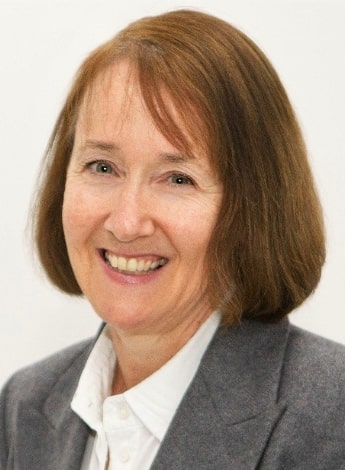
Prue Morgan, FACP, Head of Physiotherapy at Monash University, says there are many reasons people get involved in research, including exposure to research during training or as a junior clinician.
However, there is increasing recognition of the value of a PhD, especially in the public health sector where research is being embedded into allied health departments and career structures and pathways are adjusting to accommodate clinician–researchers.
In the private sector, it is less common for a PhD to confer a direct advantage.
However, practices combining clinical physiotherapy with research, such as private practitioner and researcher Associate Professor Jon Ford's Advance Healthcare, are appearing.
'Careers after completing a PhD can be challenging in the current environment, but even if you can't secure an ongoing academic role with a university, many organisations value the skill set a PhD brings, including writing and analytical skills as well as the proven ability to complete tasks and complex projects,’ says Jon.
The process of completing a PhD teaches students a lot more than just how to do research.
Prue says a PhD is essentially a whole project that you need to manage, so developing project management skills is a key outcome, as is the ability to solve problems.
‘If you’re in a leadership role in your organisation, those skills are really valuable—we need to justify so much of what we do, we need to argue and we need to put the economic value forward.
'I think a PhD allows you to formally develop those skills,’ she says.
Clinical researcher Dr David Snowdon splits his time between a Research Fellowship at Monash University and his position as an Allied Health Research Lead at Peninsula Health.
He says a PhD has enhanced his clinical skills by deepening his understanding and building on his problem-solving and clinical reasoning skills.
The number one thing David says he learned as a PhD student is simply being more open to being wrong and learning from it when he is.
It’s something he applies now to all aspects of his career.
‘You have to keep an open mind [and consider] that the findings from your study and your interpretation of those findings could be open to different perspectives.
'It’s not so much about being wrong, it’s more about understanding that yours is not the only perspective on an issue or a problem,’ he explains.
This means being open to new ideas and looking at problems from other perspectives, whether it is a research problem or a clinical issue in a patient you are treating, he says.
‘It does lead you to continually be questioning: Am I viewing this problem from all possible angles?
'Is there something more I can do?’
The idea of having a formal non-clinical pathway for physiotherapists interested in research is not new.
While it’s not particularly well known, the Australian College of Physiotherapists has a non-clinical pathway to Fellowship by Original Contribution, which requires submission of original work in the form of a book or a body of research that has made a significant contribution to physiotherapy practice.
In fact, this was the original pathway to Fellowship.
However, in the College’s 50 years, only 19 Fellowships have been awarded for Original Contribution, out of 185 Fellowships in total.
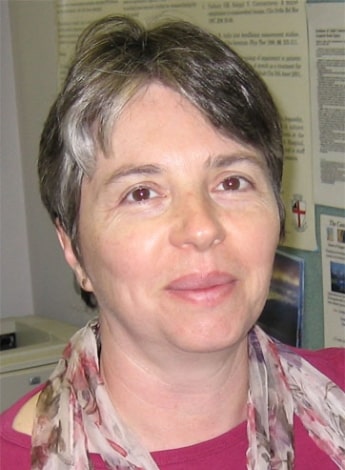
Edith Cowan University's Barby Singer, FACP, says physiotherapists often pursue research in order to solve a particular problem.
Two years ago, the APA introduced a non-clinical titling pathway for physiotherapists focused on research.
Members can apply for the title of APA Research Physiotherapist if they have a master’s by research, a Master of Philosophy or a PhD.
Associate Professor Gavin Williams, himself a Fellow of the College by Original Contribution and an APA Neurological Physiotherapist, is on the College’s Fellowship Programs Standing Committee, which is investigating updating the Original Contribution pathway with a more holistic assessment of the body of research, looking not just at published papers and books, but at all of the contributions the researcher has made.
‘We are still working on exactly what we will call it—a research scholar or a physiotherapy researcher—but we are looking at communication, collaboration, leadership, health advocacy and other professional activities.
When applying for Fellowship, you would also include how your work may influence policy, or implementation work you’ve done to actually change practice, as well as things like international conferences you may have been invited to speak at.
It’s having to demonstrate your research leadership in a number of ways other than just purely how many papers you’ve published and the metrics of those papers,’ Gavin says.
Barby, who is the College's co-Vice-President, says the updated research pathway to Fellowship will be rolled out in the near future.
How to do a PhD
So, you think you might be interested in doing some physiotherapy research.
Where do you go next?
Whether you are fresh out of your physiotherapy training or with 20 years of clinical practice behind you, the first step is to find a mentor.
'I think the toe-in-the-water approach is always a good starting point.
'The key is finding a research mentor and a research team that's well resourced, with the right approach to research mentorship.
'By committing to voluntary work (depending on available resources), you can start contributing to research projects and papers, resulting in co-authorship,’ says Jon.
It’s important to read as much as you can about the research area that interests you the most, Jon adds.
‘I would have read 2000 papers on back pain before I started my PhD in this area, which gave me a really good understanding of my research question before I started.’
David says it’s important to go into research with a passion for research, not just the topic.
‘Because you can be interested and passionate about a certain topic, but if you’re not interested in becoming a researcher and the research side of things, it would be a very hard slog and it would be hard to finish a PhD.
'For me, 90 per cent of a PhD was learning that skill set, learning how to analyse data and write and apply for ethics approval.’
Many physiotherapy PhD students work for a number of years as a clinician before they decide to do a PhD.
In PhD student Melani Boyce’s case, her research interests came from her interest in learning more about a specific condition seen in her clinical practice.
When the opportunity to do some research evolved into an opportunity to do a PhD, she took it.
Melani’s supervisor, Arianne Verhagen, says that a simple Google search on topics of interest can identify potential supervisors.
‘Have a chat with them or see if they have any assistant work that needs to be done,’ says Arianne.
One big barrier for prospective PhD students is money.
Physiotherapy is a relatively well-paid profession in comparison to being a student.
Arianne, who was a researcher in the Netherlands before moving to Australia several years ago, says the postgraduate system in Australia is not really designed to support older students who return to study after working professionally.
‘In the Netherlands, it is not very well paid, but it is a paid job.
'We have a lot of physios doing a PhD after 10 or 15 years in clinical practice, saying “Now I feel I need to contribute something to the body of knowledge of my profession”.
'It is a problem here in Australia because you go back to a student salary and you can’t pay a mortgage from that,’ she says.
Prue agrees, noting that it is usually the younger PhD students who do their research full-time, as they don’t have the same commitments—a mortgage, a family or a business to run.
‘Many more senior people choose to do a PhD part-time.
'That way, they can continue working in their practice.
'Obviously, it’s a little bit more secure financially.
'And, particularly if they’re wanting to answer a clinical question, they’re already embedded in the clinical environment and that gives them good access or opportunity to engage with their patient populations whilst they’re doing their PhDs,’ she says.
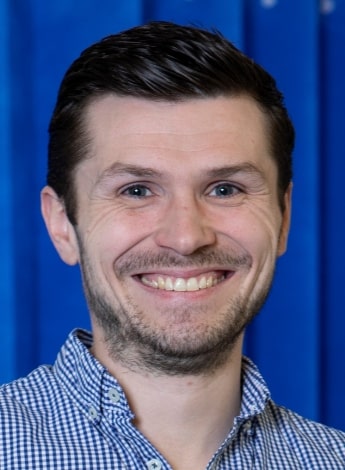
David Snowdon found building a research skill set through a PhD to be interesting and valuable in its own right.
In fact, many students choose to keep working in the clinic on the side, while they complete their PhD research.
‘Most research supervisors allow some degree of clinical work but how much work is allowed depends on the research supervisor and also the university requirements.
'My personal view is that clinical work informs research projects and that both can co-exist,’ says Jon, who continued working as a clinician while doing his PhD.
David says he found it tricky to balance clinical work and research at first.
While many PhD students work part-time and fit their research into one or two days a week, he found it easier to flip it so he focused on research during the week and picked up casual shifts in physiotherapy on the weekends and holidays.
‘It suited me to work clinically one or two days a week and not feel like I was going to lose that expertise.
Working on weekends, you are quite autonomous and I think you have to have an advanced skill set because anything can be thrown at you,’ he says.
Melani, who sees herself first and foremost as a clinician, says she finds it easier to have designated clinic days and research days during the week.
While doing her PhD part-time means it will take up to eight years instead of four, it gives her the balance she needs so she can also spend time with her family.
‘I don’t find it difficult to separate them.
'I’ve been doing the research mostly from home so it feels different from going to work.
'It’s like having two separate jobs, even though they are related.
'There’s no way that I could do a PhD on top of working full-time, because it requires so much time and I certainly don’t have that much time for study in the evenings or on weekends.’
A private approach to research
As an academic, a clinician and the managing director of Advance Healthcare, a network of six practices, physiotherapist Dr Jon Ford wears a lot of hats.
He completed a PhD in physiotherapy at La Trobe University and is an Associate Professor and Group Leader in the Low Back Pain Research Team.
Jon is also an APA Pain Physiotherapist and APA Musculoskeletal Physiotherapist and a Fellow of the Australian College of Physiotherapists by Original Contribution.
He is in the process of completing his clinical Fellowship in Pain as a member of the first cohort to go through the new specialisation pathway.
Jon says he’s always had a two-pronged approach to his career, developing both clinical capabilities and research output in a mutually beneficial way.
‘When the pain specialisation program came up I saw it as a great opportunity to further improve my clinical skills, within an evidence-informed context.
'My primary career goal is to strive to optimise patient outcomes and I feel this fusion of clinical and research approaches has been fruitful in that,’ he says.
Jon’s private practice is primarily a multidisciplinary pain management service where the best evidence-base is incorporated with insights from experienced pain physicians, physiotherapists and psychologists to optimise outcomes in people with chronic pain.
Unusually for a private clinic, however, Advance Healthcare has a strong research program of its own, focused on determining the effectiveness of individualised treatment (based on the biopsychosocial model) for people with musculoskeletal pain, particularly in the lower back.
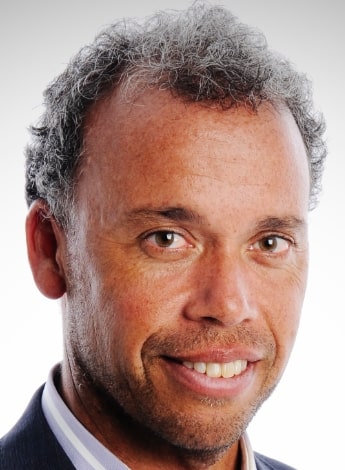
Jon Ford has found research output and clinical capabilities to be mutually beneficial and considers physiotherapists with PhDs a valuable asset in his private practice.
‘One of the pitfalls of randomised controlled trials in musculoskeletal research is simplistic or generic treatment that is incongruent with contemporary clinical reasoning approaches being evaluated (usually showing limited effectiveness).
'In all of our published and up-and-coming RCTs we make every effort to address this issue with detailed clinical protocols that reflect best practice within the clinical community.
'The results of our RCTs generally show at least moderate effects on pain and function as well as cost-effectiveness as a result of a more individualised approach to patient care,’ he says.
While physiotherapists with PhDs are not common in the private practice side of the industry, Jon believes they are a valuable asset and has hired quite a few to work at Advance Healthcare.
‘Advance Healthcare has four existing PhD-qualified practitioners and a further three currently completing this higher degree with the support of the organisation.
'In addition, we provide research mentoring for practitioners wanting to explore research options and fully funded PhD programs, including supervision, with our collaboration at La Trobe University,’ he says.
‘A PhD brings a proven capability from an intellectual, problem-solving and task completion perspective.
'In addition, there can be variability in practitioners’ willingness to follow evidence-based principles and our PhDs are more committed to working within and being a role model for this approach,’ he says.
In addition to these capabilities, practitioners with a PhD bring a deep knowledge of their own special area of interest that is incredibly valuable clinically, he adds.
‘We pay our PhD graduates a higher rate in recognition of the qualification, expertise and value they bring to our group,’ Jon says.
Building a research skill set
Dr David Snowdon went straight to work in public hospitals when he graduated as a physiotherapist and has stayed in that sector ever since, working in rehabilitation.
While he has completed a PhD and moved into research roles within the public health sector, he has never lost touch with clinical practice, working weekend and public holiday shifts in the acute and subacute hospital settings.
David started down the path of research during the years after he graduated as a physiotherapist and started working in the hospital sector.
As a junior physiotherapist he helped out on a couple of research projects and led a systematic review, but the rotations typical of early physiotherapy employment made it difficult to do more.
When he moved into a Grade 2 position, however, he started thinking more seriously about research, pitching a project on hip fractures and improving patient mobility that for various reasons didn’t get support from management.
The process of writing a project protocol and engaging with researchers whetted his appetite for more and he jumped at the chance to be involved in more research.
The next opportunity came along in the form of a project looking at clinical supervision at the health service and that led to another project, which turned into a PhD, says David.
Unlike some researchers, who are only passionate about a specific topic and want to know everything there is to know about it, he says he was just as interested in building the research skill set.
‘I think a lot of people say “I want to know more about headaches” or “I want to know more about ankle fractures”.
'But for me, it was more “This is a topic I’m interested in.
"It’s not necessarily my number one passion in life, but what I am passionate about is learning how to research and learning those skills so in the future, I can research whatever I want to research”,’ David says.
Ultimately, David was able to use his project in clinical supervision to go back and look at patients with hip fractures, his original interest.
‘I do think that while you need to have a topic you’re interested in, you need to be interested in research and learning about how to become a researcher.
'I think that’s just as important as choosing a topic you’re interested in,’ he says.
Once David finished his PhD he was well placed to move into a public health research role, landing a position as an Allied Health Research Lead at Peninsula Health in Melbourne.
‘My PhD really lent itself to going into a role where we support clinicians both through research and to use evidence in their practices, working predominantly with the physiotherapy department, but also with other allied health professions, conducting research and translating research into practice,’ David says.
Earlier this year, David added a new role, joining the National Centre for Healthy Ageing, a collaboration between Monash University and Peninsula Health, as a Research Fellow.
‘We are building a big data platform where we collect health information to answer questions on how we can help people to remain healthy as they age,’ David says.
‘It’s a little bit more of a pure research role and less of a supportive role, but one day a week, I still work in the public health system and help departments and professionals to conduct research.
'And I still work clinically, for another public health organisation, on weekends.’
One opportunity leads to another and then to a PhD
Melani Boyce is about halfway through her PhD at the University of Technology Sydney under the supervision of Professor Arianne Verhagen.
Unlike many who find their way to research earlier in their careers, Melani has been a clinical physiotherapist for more than 20 years, working in neurology at Westmead Hospital.
In the early 2000s she won a scholarship to work with a physiotherapist in France on the treatment of cervical dystonia, a painful neurological condition in which the neck muscles contract involuntarily, causing the head to twist or turn to one side or tilt forwards or backwards.
The stint in France led to a research project, which led to a master’s degree on dystonia.
That was supposed to be the end of it, until Melani met Professor Lynley Bradnam, at the time the head of physiotherapy at the University of Technology Sydney and a researcher into dystonia.
‘Once I met Lynley, we started talking about collaborating on more research together.
'That’s how I enrolled in my PhD at UTS because she was working there and we were hoping to work together,’ Melani says.
Melani is doing her PhD part-time and is still working two days a week as a senior clinical specialist in the neurology outpatient clinic at Westmead.
She says NSW Health and Westmead Hospital are very accommodating to employees doing higher degrees and her managers in the physiotherapy department at Westmead are very supportive of research.
‘In general, I try to keep those two days at Westmead clinical and do the research on other days.
'But if something has to be done urgently on a working day, then they are very supportive,’ she says.
Melani also brings a clinical angle to her PhD research, in contrast to doing lab-based studies.
For her, the clinical perspective is all-important.
She says it comes from being a clinician first and a researcher second, rather than the other way around.
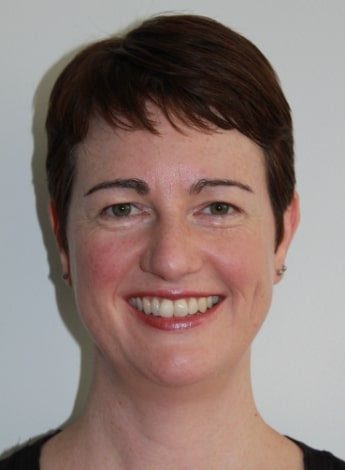
Melani Boyce is doing her PhD part-time and finds it helpful to work as a clinician in the field she is studying.
‘When Lynley and I were originally planning the first study, she was more involved with lab-based research.
'I wanted to do something more clinically relevant, something other physios could reproduce in their practice,’ she says.
She notes it is also helpful to be working as a clinician in the field she is researching.
‘If I need to recruit patients, they are being referred to me anyway for physio so I can talk to them about the research and see if they are happy to join the project,’ she says.
Ultimately, Melani doesn’t see herself leaving clinical practice once her PhD has been completed, although given the opportunity, she’d like to keep doing research in some capacity.
‘I hope to finish the PhD and use the knowledge in the clinical work I’m doing with these patients; that’s the whole point for me.
'My ideal job would be a part-time clinical and part-time research or teaching position.
'I don’t know whether those jobs exist in Sydney at the moment.
'But that would be perfect, I think,’ she says.
‘I came to research after more than 10 years of clinical experience.
'I got to a point where I felt like I was quite competent at what I was doing clinically—research was a way to extend myself.
'Research keeps me thinking and presents constant challenges for my brain.
'That is what I get out of it, along with the hope that my research will improve the therapy options for people with dystonia.’
© Copyright 2024 by Australian Physiotherapy Association. All rights reserved.





